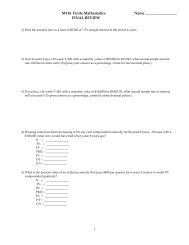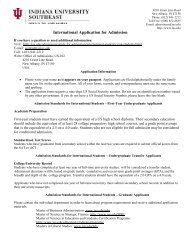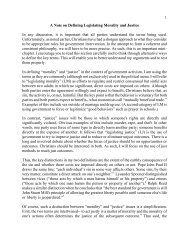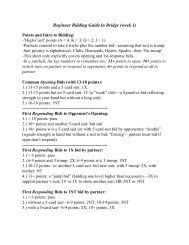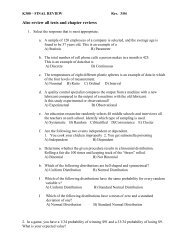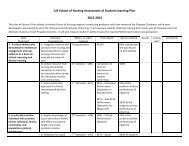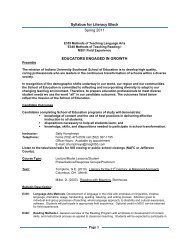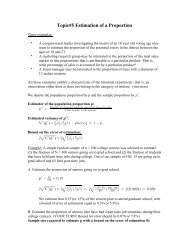- Page 1 and 2:
NIntel® 64 and IA-32 Architectures
- Page 4 and 5:
CONTENTS2.3.1 Front End. . . . . .
- Page 6 and 7:
CONTENTS3.7 PREFETCHING . . . . . .
- Page 8 and 9:
CONTENTS5.7.2.1 Increasing Memory B
- Page 10 and 11:
CONTENTS9.5.3 Streaming Store Instr
- Page 13 and 14:
CONTENTSB.7.4.3B.7.4.4B.7.4.5B.7.4.
- Page 15 and 16:
CONTENTSExample 4-1. Identification
- Page 17 and 18:
CONTENTSExample 9-8. Using HW Prefe
- Page 19 and 20:
CONTENTSFigure 9-7. Cache Blocking
- Page 21 and 22:
CHAPTER 1INTRODUCTIONThe Intel® 64
- Page 23 and 24:
INTRODUCTION• Chapter 10: Power O
- Page 25 and 26:
CHAPTER 2INTEL ® 64 AND IA-32 PROC
- Page 27 and 28:
INTEL® 64 AND IA-32 PROCESSOR ARCH
- Page 29 and 30:
INTEL® 64 AND IA-32 PROCESSOR ARCH
- Page 31 and 32:
INTEL® 64 AND IA-32 PROCESSOR ARCH
- Page 33 and 34:
INTEL® 64 AND IA-32 PROCESSOR ARCH
- Page 35 and 36:
INTEL® 64 AND IA-32 PROCESSOR ARCH
- Page 37 and 38:
INTEL® 64 AND IA-32 PROCESSOR ARCH
- Page 39 and 40:
INTEL® 64 AND IA-32 PROCESSOR ARCH
- Page 41 and 42:
INTEL® 64 AND IA-32 PROCESSOR ARCH
- Page 43 and 44:
INTEL® 64 AND IA-32 PROCESSOR ARCH
- Page 45 and 46:
INTEL® 64 AND IA-32 PROCESSOR ARCH
- Page 47 and 48:
INTEL® 64 AND IA-32 PROCESSOR ARCH
- Page 49 and 50:
INTEL® 64 AND IA-32 PROCESSOR ARCH
- Page 51 and 52:
INTEL® 64 AND IA-32 PROCESSOR ARCH
- Page 53 and 54:
INTEL® 64 AND IA-32 PROCESSOR ARCH
- Page 55 and 56:
INTEL® 64 AND IA-32 PROCESSOR ARCH
- Page 57 and 58:
INTEL® 64 AND IA-32 PROCESSOR ARCH
- Page 59 and 60:
INTEL® 64 AND IA-32 PROCESSOR ARCH
- Page 61 and 62:
INTEL® 64 AND IA-32 PROCESSOR ARCH
- Page 63 and 64:
INTEL® 64 AND IA-32 PROCESSOR ARCH
- Page 65 and 66:
INTEL® 64 AND IA-32 PROCESSOR ARCH
- Page 67 and 68:
INTEL® 64 AND IA-32 PROCESSOR ARCH
- Page 69 and 70:
INTEL® 64 AND IA-32 PROCESSOR ARCH
- Page 71 and 72:
INTEL® 64 AND IA-32 PROCESSOR ARCH
- Page 73 and 74:
INTEL® 64 AND IA-32 PROCESSOR ARCH
- Page 75 and 76:
CHAPTER 3GENERAL OPTIMIZATION GUIDE
- Page 77 and 78:
GENERAL OPTIMIZATION GUIDELINESThe
- Page 79 and 80:
GENERAL OPTIMIZATION GUIDELINEScomp
- Page 81 and 82:
GENERAL OPTIMIZATION GUIDELINES•
- Page 83 and 84:
GENERAL OPTIMIZATION GUIDELINESExam
- Page 85 and 86:
GENERAL OPTIMIZATION GUIDELINESthro
- Page 87 and 88:
GENERAL OPTIMIZATION GUIDELINESAsse
- Page 90 and 91:
GENERAL OPTIMIZATION GUIDELINESpred
- Page 92 and 93:
GENERAL OPTIMIZATION GUIDELINESIn t
- Page 94 and 95:
GENERAL OPTIMIZATION GUIDELINESExam
- Page 96 and 97:
GENERAL OPTIMIZATION GUIDELINESThe
- Page 98 and 99:
GENERAL OPTIMIZATION GUIDELINESBeca
- Page 100 and 101:
GENERAL OPTIMIZATION GUIDELINESInst
- Page 102 and 103:
GENERAL OPTIMIZATION GUIDELINESXOR
- Page 104 and 105:
GENERAL OPTIMIZATION GUIDELINESUse
- Page 106 and 107:
GENERAL OPTIMIZATION GUIDELINESvalu
- Page 108 and 109:
GENERAL OPTIMIZATION GUIDELINES•
- Page 110 and 111:
GENERAL OPTIMIZATION GUIDELINESMOVS
- Page 112 and 113:
GENERAL OPTIMIZATION GUIDELINESAsse
- Page 114 and 115:
GENERAL OPTIMIZATION GUIDELINESPack
- Page 116 and 117:
GENERAL OPTIMIZATION GUIDELINES3.5.
- Page 118 and 119:
GENERAL OPTIMIZATION GUIDELINES3.5.
- Page 120 and 121:
GENERAL OPTIMIZATION GUIDELINESFor
- Page 122 and 123:
GENERAL OPTIMIZATION GUIDELINES3.6.
- Page 124 and 125:
GENERAL OPTIMIZATION GUIDELINES3.6.
- Page 126 and 127:
GENERAL OPTIMIZATION GUIDELINESThe
- Page 128 and 129:
GENERAL OPTIMIZATION GUIDELINESAs a
- Page 130 and 131:
GENERAL OPTIMIZATION GUIDELINESTher
- Page 132 and 133:
GENERAL OPTIMIZATION GUIDELINESExam
- Page 134 and 135:
GENERAL OPTIMIZATION GUIDELINESExam
- Page 136 and 137:
GENERAL OPTIMIZATION GUIDELINES—
- Page 138 and 139:
GENERAL OPTIMIZATION GUIDELINESAsse
- Page 140 and 141:
GENERAL OPTIMIZATION GUIDELINESmore
- Page 142 and 143:
GENERAL OPTIMIZATION GUIDELINESrequ
- Page 144 and 145: GENERAL OPTIMIZATION GUIDELINESmiss
- Page 146 and 147: GENERAL OPTIMIZATION GUIDELINESpref
- Page 148 and 149: GENERAL OPTIMIZATION GUIDELINESpref
- Page 150 and 151: GENERAL OPTIMIZATION GUIDELINES—
- Page 152 and 153: GENERAL OPTIMIZATION GUIDELINES•
- Page 154 and 155: GENERAL OPTIMIZATION GUIDELINESTher
- Page 156 and 157: GENERAL OPTIMIZATION GUIDELINESstat
- Page 158 and 159: GENERAL OPTIMIZATION GUIDELINESexte
- Page 160 and 161: GENERAL OPTIMIZATION GUIDELINESFor
- Page 162 and 163: CODING FOR SIMD ARCHITECTURES4.1.1
- Page 164 and 165: CODING FOR SIMD ARCHITECTURESSoftwa
- Page 166 and 167: CODING FOR SIMD ARCHITECTURESTo use
- Page 168 and 169: CODING FOR SIMD ARCHITECTURES4.3.1
- Page 170 and 171: CODING FOR SIMD ARCHITECTURESExampl
- Page 172 and 173: CODING FOR SIMD ARCHITECTURESmance
- Page 174 and 175: CODING FOR SIMD ARCHITECTURESpurpos
- Page 176 and 177: CODING FOR SIMD ARCHITECTURES4.4.3
- Page 178 and 179: CODING FOR SIMD ARCHITECTURESIf the
- Page 180 and 181: CODING FOR SIMD ARCHITECTURESExampl
- Page 182 and 183: CODING FOR SIMD ARCHITECTURES• Us
- Page 184 and 185: CODING FOR SIMD ARCHITECTURESpatter
- Page 186 and 187: CODING FOR SIMD ARCHITECTURESmoves
- Page 188 and 189: CODING FOR SIMD ARCHITECTURES4-28
- Page 190 and 191: OPTIMIZING FOR SIMD INTEGER APPLICA
- Page 192 and 193: OPTIMIZING FOR SIMD INTEGER APPLICA
- Page 196 and 197: OPTIMIZING FOR SIMD INTEGER APPLICA
- Page 198 and 199: OPTIMIZING FOR SIMD INTEGER APPLICA
- Page 200 and 201: OPTIMIZING FOR SIMD INTEGER APPLICA
- Page 202 and 203: OPTIMIZING FOR SIMD INTEGER APPLICA
- Page 204 and 205: OPTIMIZING FOR SIMD INTEGER APPLICA
- Page 206 and 207: OPTIMIZING FOR SIMD INTEGER APPLICA
- Page 208 and 209: OPTIMIZING FOR SIMD INTEGER APPLICA
- Page 210 and 211: OPTIMIZING FOR SIMD INTEGER APPLICA
- Page 212 and 213: OPTIMIZING FOR SIMD INTEGER APPLICA
- Page 214 and 215: OPTIMIZING FOR SIMD INTEGER APPLICA
- Page 216 and 217: OPTIMIZING FOR SIMD INTEGER APPLICA
- Page 218 and 219: OPTIMIZING FOR SIMD INTEGER APPLICA
- Page 220 and 221: OPTIMIZING FOR SIMD INTEGER APPLICA
- Page 222 and 223: OPTIMIZING FOR SIMD INTEGER APPLICA
- Page 224 and 225: OPTIMIZING FOR SIMD INTEGER APPLICA
- Page 226 and 227: OPTIMIZING FOR SIMD INTEGER APPLICA
- Page 228 and 229: OPTIMIZING FOR SIMD FLOATING-POINT
- Page 230 and 231: OPTIMIZING FOR SIMD FLOATING-POINT
- Page 232 and 233: OPTIMIZING FOR SIMD FLOATING-POINT
- Page 234 and 235: OPTIMIZING FOR SIMD FLOATING-POINT
- Page 236 and 237: OPTIMIZING FOR SIMD FLOATING-POINT
- Page 238 and 239: OPTIMIZING FOR SIMD FLOATING-POINT
- Page 240 and 241: OPTIMIZING FOR SIMD FLOATING-POINT
- Page 242 and 243: OPTIMIZING FOR SIMD FLOATING-POINT
- Page 244 and 245:
OPTIMIZING FOR SIMD FLOATING-POINT
- Page 246 and 247:
OPTIMIZING FOR SIMD FLOATING-POINT
- Page 248 and 249:
OPTIMIZING FOR SIMD FLOATING-POINT
- Page 250 and 251:
MULTICORE AND HYPER-THREADING TECHN
- Page 252 and 253:
MULTICORE AND HYPER-THREADING TECHN
- Page 254 and 255:
MULTICORE AND HYPER-THREADING TECHN
- Page 256 and 257:
MULTICORE AND HYPER-THREADING TECHN
- Page 258 and 259:
MULTICORE AND HYPER-THREADING TECHN
- Page 260 and 261:
MULTICORE AND HYPER-THREADING TECHN
- Page 262 and 263:
MULTICORE AND HYPER-THREADING TECHN
- Page 264 and 265:
MULTICORE AND HYPER-THREADING TECHN
- Page 266 and 267:
MULTICORE AND HYPER-THREADING TECHN
- Page 268 and 269:
MULTICORE AND HYPER-THREADING TECHN
- Page 270 and 271:
MULTICORE AND HYPER-THREADING TECHN
- Page 272 and 273:
MULTICORE AND HYPER-THREADING TECHN
- Page 274 and 275:
MULTICORE AND HYPER-THREADING TECHN
- Page 276 and 277:
MULTICORE AND HYPER-THREADING TECHN
- Page 278 and 279:
MULTICORE AND HYPER-THREADING TECHN
- Page 280 and 281:
MULTICORE AND HYPER-THREADING TECHN
- Page 282 and 283:
MULTICORE AND HYPER-THREADING TECHN
- Page 284 and 285:
MULTICORE AND HYPER-THREADING TECHN
- Page 286 and 287:
MULTICORE AND HYPER-THREADING TECHN
- Page 288 and 289:
MULTICORE AND HYPER-THREADING TECHN
- Page 290 and 291:
MULTICORE AND HYPER-THREADING TECHN
- Page 292 and 293:
MULTICORE AND HYPER-THREADING TECHN
- Page 294 and 295:
OPTIMIZING CACHE USAGE• Take adva
- Page 296 and 297:
OPTIMIZING CACHE USAGEHardware pref
- Page 298 and 299:
OPTIMIZING CACHE USAGEThe non-tempo
- Page 300 and 301:
OPTIMIZING CACHE USAGE9.5.1.3 Memor
- Page 302 and 303:
OPTIMIZING CACHE USAGENOTEFailure t
- Page 304 and 305:
OPTIMIZING CACHE USAGE9.5.5 CLFLUSH
- Page 306 and 307:
OPTIMIZING CACHE USAGE• The hardw
- Page 308 and 309:
OPTIMIZING CACHE USAGETimeExecution
- Page 310 and 311:
OPTIMIZING CACHE USAGEschedule pref
- Page 312 and 313:
OPTIMIZING CACHE USAGEtime is large
- Page 314 and 315:
OPTIMIZING CACHE USAGEresource stal
- Page 316 and 317:
OPTIMIZING CACHE USAGEPrefetchntaDa
- Page 318 and 319:
OPTIMIZING CACHE USAGEExample 9-7.
- Page 320 and 321:
OPTIMIZING CACHE USAGEA characteris
- Page 322 and 323:
OPTIMIZING CACHE USAGE9.7 MEMORY OP
- Page 324 and 325:
OPTIMIZING CACHE USAGE9.7.2.3 Concl
- Page 326 and 327:
OPTIMIZING CACHE USAGEis not reside
- Page 328 and 329:
OPTIMIZING CACHE USAGEExample 9-11.
- Page 330 and 331:
OPTIMIZING CACHE USAGETable 9-3. De
- Page 332 and 333:
OPTIMIZING CACHE USAGE• If a proc
- Page 334 and 335:
64-BIT MODE CODING GUIDELINESAssemb
- Page 336 and 337:
64-BIT MODE CODING GUIDELINESinstru
- Page 338 and 339:
64-BIT MODE CODING GUIDELINES9-6
- Page 340 and 341:
POWER OPTIMIZATION FOR MOBILE USAGE
- Page 342 and 343:
POWER OPTIMIZATION FOR MOBILE USAGE
- Page 344 and 345:
POWER OPTIMIZATION FOR MOBILE USAGE
- Page 346 and 347:
POWER OPTIMIZATION FOR MOBILE USAGE
- Page 348 and 349:
POWER OPTIMIZATION FOR MOBILE USAGE
- Page 350 and 351:
POWER OPTIMIZATION FOR MOBILE USAGE
- Page 352 and 353:
POWER OPTIMIZATION FOR MOBILE USAGE
- Page 354 and 355:
APPLICATION PERFORMANCE TOOLSThe /f
- Page 356 and 357:
APPLICATION PERFORMANCE TOOLSTable
- Page 358 and 359:
APPLICATION PERFORMANCE TOOLSA.1.6.
- Page 360 and 361:
APPLICATION PERFORMANCE TOOLSExampl
- Page 362 and 363:
APPLICATION PERFORMANCE TOOLSExampl
- Page 364 and 365:
APPLICATION PERFORMANCE TOOLSprogra
- Page 366 and 367:
APPLICATION PERFORMANCE TOOLSThe Li
- Page 368 and 369:
APPLICATION PERFORMANCE TOOLSA.5 IN
- Page 370 and 371:
USING PERFORMANCE MONITORING EVENTS
- Page 372 and 373:
USING PERFORMANCE MONITORING EVENTS
- Page 374 and 375:
USING PERFORMANCE MONITORING EVENTS
- Page 376 and 377:
USING PERFORMANCE MONITORING EVENTS
- Page 378 and 379:
USING PERFORMANCE MONITORING EVENTS
- Page 380 and 381:
USING PERFORMANCE MONITORING EVENTS
- Page 382 and 383:
USING PERFORMANCE MONITORING EVENTS
- Page 384 and 385:
USING PERFORMANCE MONITORING EVENTS
- Page 386 and 387:
USING PERFORMANCE MONITORING EVENTS
- Page 388 and 389:
USING PERFORMANCE MONITORING EVENTS
- Page 390 and 391:
USING PERFORMANCE MONITORING EVENTS
- Page 392 and 393:
USING PERFORMANCE MONITORING EVENTS
- Page 394 and 395:
USING PERFORMANCE MONITORING EVENTS
- Page 396 and 397:
USING PERFORMANCE MONITORING EVENTS
- Page 398 and 399:
USING PERFORMANCE MONITORING EVENTS
- Page 400 and 401:
USING PERFORMANCE MONITORING EVENTS
- Page 402 and 403:
USING PERFORMANCE MONITORING EVENTS
- Page 404 and 405:
USING PERFORMANCE MONITORING EVENTS
- Page 406 and 407:
USING PERFORMANCE MONITORING EVENTS
- Page 408 and 409:
USING PERFORMANCE MONITORING EVENTS
- Page 410 and 411:
USING PERFORMANCE MONITORING EVENTS
- Page 412 and 413:
USING PERFORMANCE MONITORING EVENTS
- Page 414 and 415:
USING PERFORMANCE MONITORING EVENTS
- Page 416 and 417:
USING PERFORMANCE MONITORING EVENTS
- Page 418 and 419:
USING PERFORMANCE MONITORING EVENTS
- Page 420 and 421:
USING PERFORMANCE MONITORING EVENTS
- Page 422 and 423:
USING PERFORMANCE MONITORING EVENTS
- Page 424 and 425:
USING PERFORMANCE MONITORING EVENTS
- Page 426 and 427:
USING PERFORMANCE MONITORING EVENTS
- Page 428 and 429:
USING PERFORMANCE MONITORING EVENTS
- Page 430 and 431:
USING PERFORMANCE MONITORING EVENTS
- Page 432 and 433:
INSTRUCTION LATENCY AND THROUGHPUTW
- Page 434 and 435:
INSTRUCTION LATENCY AND THROUGHPUTo
- Page 436 and 437:
INSTRUCTION LATENCY AND THROUGHPUTT
- Page 438 and 439:
INSTRUCTION LATENCY AND THROUGHPUTT
- Page 440 and 441:
INSTRUCTION LATENCY AND THROUGHPUTT
- Page 442 and 443:
INSTRUCTION LATENCY AND THROUGHPUTT
- Page 444 and 445:
INSTRUCTION LATENCY AND THROUGHPUTT
- Page 446 and 447:
INSTRUCTION LATENCY AND THROUGHPUTT
- Page 448 and 449:
INSTRUCTION LATENCY AND THROUGHPUTT
- Page 450 and 451:
INSTRUCTION LATENCY AND THROUGHPUTT
- Page 452 and 453:
INSTRUCTION LATENCY AND THROUGHPUTT
- Page 454 and 455:
INSTRUCTION LATENCY AND THROUGHPUTT
- Page 456 and 457:
INSTRUCTION LATENCY AND THROUGHPUT
- Page 458 and 459:
INSTRUCTION LATENCY AND THROUGHPUTC
- Page 460 and 461:
STACK ALIGNMENTThe solution to this
- Page 462 and 463:
STACK ALIGNMENTExample D-1. Aligned
- Page 464 and 465:
STACK ALIGNMENTExample D-2. Aligned
- Page 466 and 467:
STACK ALIGNMENTD-8
- Page 468 and 469:
SUMMARY OF RULES AND SUGGESTIONSret
- Page 470 and 471:
SUMMARY OF RULES AND SUGGESTIONSfou
- Page 472 and 473:
SUMMARY OF RULES AND SUGGESTIONSvar
- Page 474 and 475:
SUMMARY OF RULES AND SUGGESTIONSto
- Page 476 and 477:
SUMMARY OF RULES AND SUGGESTIONSCor
- Page 478 and 479:
SUMMARY OF RULES AND SUGGESTIONSE-1
- Page 480 and 481:
INDEXsummary of rules, E-1tuning hi
- Page 482 and 483:
INDEXevent ratios, B-50execution co
- Page 484 and 485:
INDEXprefetching, 8-5SFENCE instruc
- Page 486 and 487:
INDEXPMAXSW, 5-28PMAXUB, 5-28PMINSW
- Page 488 and 489:
INDEXIndex-10
- Page 490:
Intel Corp.999 CANADA PLACE,Suite 4




